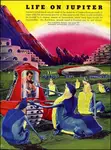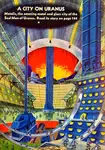solar system heritage
a Heritage of Dreams, from the days
before space probes snapped it away
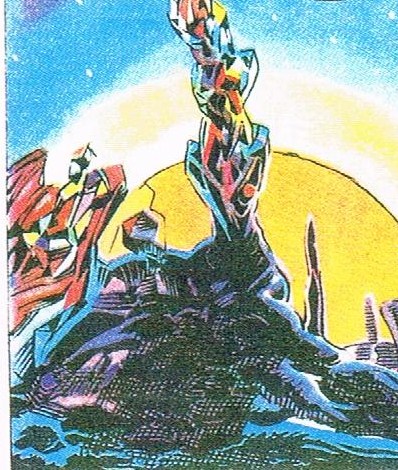
The ways we dreamed our neighbouring worlds - the range of what seemed possible, in fiction, science and art. The solar system that might have been, in its alternative sweep from the primordial past to the far future.
the range
Twilight Belt Mercury. Lush fertile Venus. Ancient Martian civilizations. Habitable surfaces on giant planets, and/or inhabited Jovian and Saturnian moons, asteroids... even life on Earth's Moon.
And Earth itself - shimmering with imagined extensions, counterparts, alternates: Pellucidar, Kroth, the Old Future...
...not to mention two "extra" worlds which have achieved fictional reality despite their factual non-existence: namely, Vulcan, and the asteroid progenitor planet...
...plus variously imagined trans-Plutonian planets and reefs of space extending to the outermost reaches of the Sun's gravitational field. And of course, possible visits to, and life on, the Sun itself.
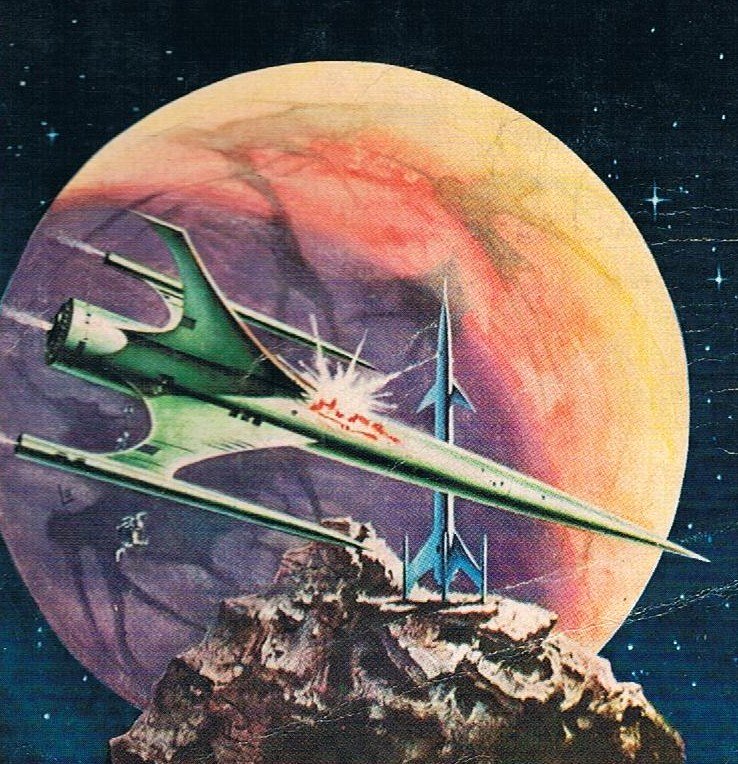
the purpose
Why this site? Why wallow in nostalgia? Well, for a start, we like to wallow; and of course our favourite dreams are ultimately relevant to our own natures. And besides - the Old Solar System (OSS), the setting for the golden oldies of planetary romance, the inspiration for Leigh Brackett and Edgar Rice Burroughs, is not yet dead.
"Not yet dead?" an ERB-fan might cry; "sounds too good to be true."
We three arguers shall hammer out an answer to that -
I, webmaster Zendexor, with my sparring partners:
Harlei, my embarrasingly naïf supporter,
and Stid, my realist critic.
Three contrarians striving to get attention - between us we should cover the issue well enough.
newness of the old
Harlei: Of course the OSS is not dead! Look how easy it is to order second-hand copies of the Barsoom books. Get them through the post and then plunge in; presto, you're back on the old Mars.
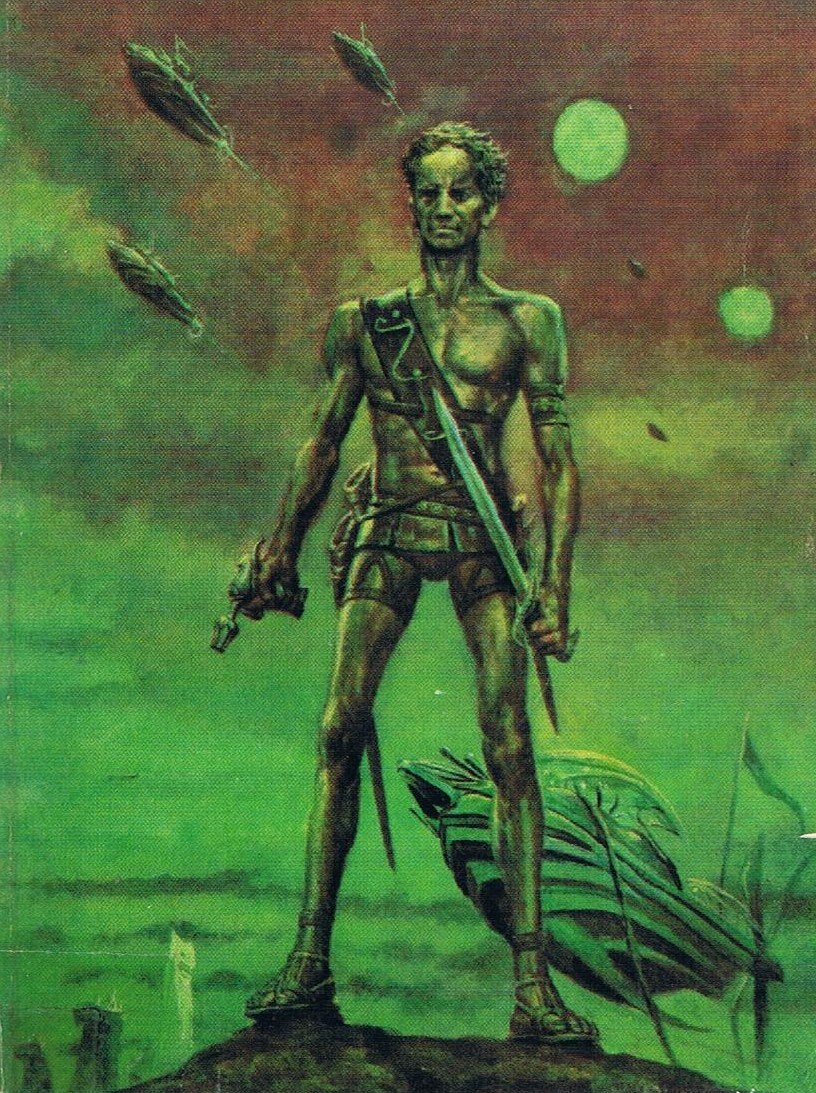 Hadron of Hastor
Hadron of HastorStid: Ha - second-hand is right! No publisher today will print stories set on a traditional Mars - the old Mars with a breathable atmosphere and ancient races of Martians. So when you've read all of that old stuff, that's it, you've run out; there isn't any more. The OSS is dead; let it lie. Concentrate on something else. Read Kim Stanley Robinson for a realistic take on how to live on Mars...
Zendexor: Wait - not quite so fast. Publishers have had a change of heart. Writers have recently been commissioned specially to write tales set on the traditional Old Mars and Old Venus, collected in anthologies thus named, and then there's the even newer, upcoming series Vintage Worlds. But I agree that by and large the fan of planetary romance has a problem, the simple problem of wanting more. What exists is never enough for the hungry sword-and-planet fan...
Stid: Though you'd think ten volumes of Barsoom would be enough.
Zendexor: Not at all, one longs for it to be longer. Pity the yarn-hungry addict of a sub-genre that's officially extinct! But comfort is on the way - in fact this website broadcasts the good news that there are some refusenik writers who still set tales in the OSS and get them published.
These Neo-OSS (NOSS) writers and their readers embody our hopes for the future development of the genre. I have mentioned the recent anthologies: and we shall be looking at other tales as well -
rebutting the chronists
Harlei: Told you so! Yippee! Stupid to say a thing's dead when not only is it alive, but it's actually reproducing itself!
Stid: Calm down, I simply ought to have said, that since the setting is defunct, no new planetary romance set in the Old Solar System can be taken seriously. All right, perhaps a few are still being published - anyone and his dog can publish nowadays - but they're pastiches. Fakes. They won't gain critical respect.
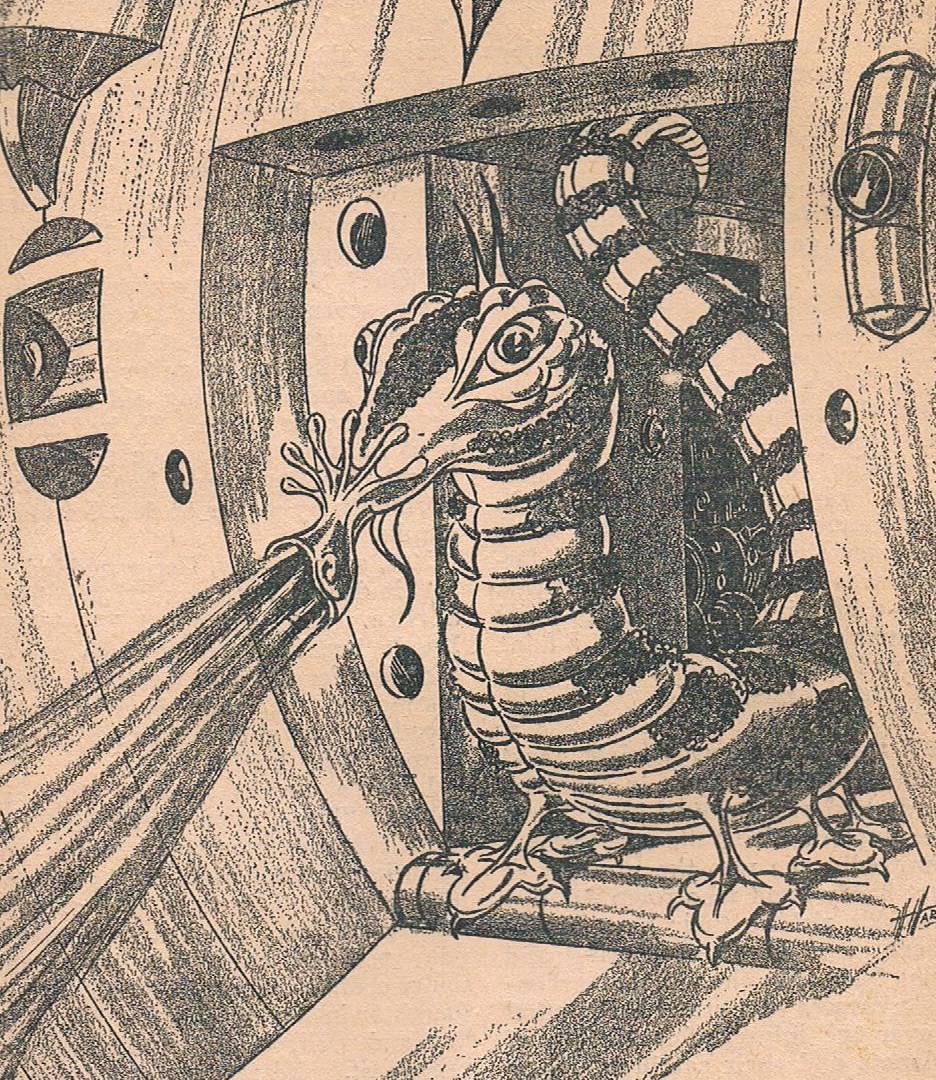 the Cacus of Jupiter Five
the Cacus of Jupiter FiveHarlei: Critics be blowed -
Zendexor: Shush, let me handle this. Stid, you just uttered the phrase "critical respect". Well, that's where we come in.
Stid: Count me out.
Zendexor: No, we're counting you in, as our devil's advocate. This website shall plunge more deeply into these issues, but let me deal here with two points.
First, you can't dismiss new-OSS writers such as S M Stirling and Robert Gibson by categorizing their works as "pastiche" - they plainly aren't.
They are, if you like, "alternate planetology". After all, alternate history is a recognized genre, so much so that a novel like Fatherland does not even require an explanation or framing device - it simply plunges the reader without more ado into the year 1964 in a world in which Germany won World War Two. So if alternate history is allowed, why not alternate planetology?
Second, just suppose, on the other hand, that we do decide to view neo-OSS works as pastiche - then so what? What's wrong with successful pastiche?
Your chronist fallacy -
Stid: My what?
Zendexor: - your chronist fallacy is ripe for demolition. I refer to the silly idea that a work should be judged not only for what it is but also for the date of its creation. You get it in architecture too - e.g. when Pevsner complains about a perfectly good building, just because it was built in imitation of a past style. And some people wanted to knock down St Pancras because they disapproved of Victorian Gothic. Crazy.
However, I mustn't go on. Don't want to give the wrong impression. What we're building here is not just a nostalgia site.
In fact we shall argue seriously that the OSS / NOSS has its uses. There is lasting value in the colourful speculations of yore.
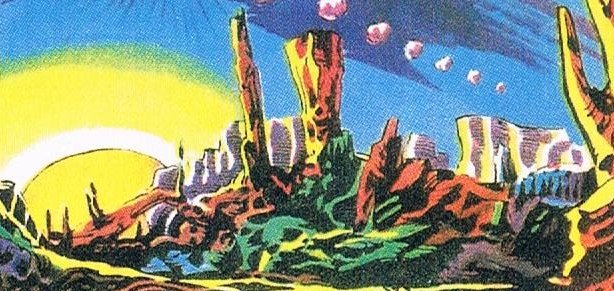
But we're not ashamed of pure nostalgia, either! It's natural, it's warm human nature, to lavish the most love on the most lovable things. And the Solar System of Burroughs, Brackett, Hamilton, Lewis et al. was a gorgeous scene.
Though the modern Mars revealed by VIKING and the Rovers SPIRIT, OPPORTUNITY and CURIOSITY is an interesting place, yet Barsoom and Malacandra beat it hollow. MESSENGER showed us an interesting Mercury, but Valeddom pays homage to a greater truth.
So whenever a modern author ignores the findings of probes and portrays a Solar System world as it ought to be rather than as it is - as Zelazny did in A Rose for Ecclesiastes - we should applaud.
Applaud also the way adventures can happen in the Old Solar System. The individual pioneering, the free-and-easy tumbling into situations, the prospectors, loners, outlaws, migrants plying the spacelanes and getting themselves lost and stumbling into mysteries - a range typified by the sprawl of Edmond Hamilton's tales.
Moreover, why should we lack - why should we go short - merely because Golden Age writers left certain tasks unfinished? The NOSS is needed as a filler of gaps! That alone is reason enough for us to support an extension to the Golden Age.
Think, for example, of the staggering under-exploited fictional potential of giant planets imagined with solid surfaces! Turn your mind to it, picture that range of explorable ground, the billions of square miles on a treadable Jupiter, Saturn, Uranus, Neptune... and all the unfinished business which we shall look at on our page devoted to tales unwritten.
Fortunately, ideas - which after all are events in the mind - are as real as the mind is real, and therefore fiction is a fact.
To put it even more simply:
All that is, is.
the invitation
So feel free to celebrate our heritage, the great Old Solarian echo-chamber in the human imagination.
Enjoy the scope provided by the traditional nine-planet Solar System, with its wonders that flow in a great river of ideas, roaring out from the catchment basin of our former scientific speculations and the underlying influence of older astrological fancies, to debouch in the pages of planetary romance...
...collectively to form gestalts, personalities, characters of worlds - as if the planetary souls were Hulmu-type entities lashing with potentiality, forging a glittering unity-in-multiplicity....
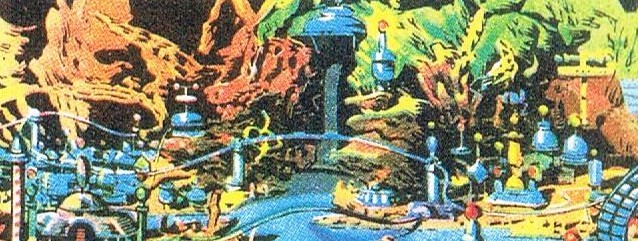 native city of Mercury's Twilight Belt
native city of Mercury's Twilight BeltAuthor allusions on this page: Leigh Brackett, who wrote classic tales with OSS settings for the magazine Planet Stories; Edgar Rice Burroughs, creator of the hollow inner Earth called Pellucidar (seven volumes), and of the classic vision of Mars as "Barsoom" (ten volumes, written in the period 1911-1940); Robert Gibson, creator of Kroth, an Earth you can fall off due to its unidirectional gravity; Valeddom (2013), set on a traditional Twilight Belt Mercury; and Uranian Gleams, a saga of the seventh planet; Edmond Hamilton, author of a vast range of colourful OSS adventures; Robert Harris, Fatherland (1992); C S Lewis, in whose novel Out of the Silent Planet (1938) Mars is named Malacandra by its inhabitants; editors George R R Martin and Gardner Dozois who have produced the "New OSS" collections Old Mars (2013) and Old Venus (2015); Kim Stanley Robinson, author of a massive trilogy on the terraforming of Mars and the settlement of other worlds in the Solar System; S M Stirling who has given us a modern "take" on the traditional Venus in The Sky People (2006) and on the traditional Mars in his In the Courts of the Crimson Kings (2008); Roger Zelazny, "A Rose for Ecclesiastes" (1963)
Note, that in the main text of the pages of this website we shall usually refer to works by their titles only, so that authors' names tend to be left to pool at the bottom in the "allusions" box. This is our way of emphasizing the OSS as a collective achievement. It's as though the authors were like the anonymous sculptors on medieval cathedrals, or like a team of drillers releasing one combined gusher of ideas.
acronyms for versions of the solar system
OSS - Old Solar System.
NSS - New Solar System - i.e. what this site isn't about. (Also called RSS - R for Realistic.)
NOSS (or Neo-OSS) - Recent retro OSS writings, composed after the advent of the space age. (See for example The Sky People, In the Courts of the Crimson Kings, and Valeddom.) The NOSS sub-genre can be divided into two sub-sub-genres, the Reactionary and the Trendy. In the one, the writer "goes the whole hog" and gives us not only traditional worlds but also traditional characters with attitudes and mores reminiscent of the OSS golden age. In the other, the writer gives us traditional worlds but contemporary-style characters, with behaviour and speech patterns redolent of our culture. I have termed the two types NOSS-R and NOSS-T.
RSS- the Realist Solar System - another term for the NSS.
NHOSS - Combination of NOSS with an alternative Earth history
that shifts the Space Age dramatically into the past. (See for example Sailing the Seven Spaceways, Arabella of Mars, and A Man Without Honor. Also, the fictional universe of David England.)
WOSS - the Woke Old Solar System.
more possibly-useful jargon
We've found it useful to coin many other terms, but you don't
need to think about that now; just be reassured that they will be
placed at your fingertips when the occasion arises.
For later reference as and when needed, here they are:
BREM - the Breathable-Air Mars (see the Mars page).
CLUFF - Cute Little Unfulfilling Fragment of Fascination.
CRIM - Classic Ramshackle Interstellar Milieu - see the definition in the OSS Diary for 14th August 2016, and the discussion which extends to the two subsequent entries of the Diary.
COMOLD - the Common-Origin Let-Down.
FNOM - the "For Natives Only" Mars - see the OSS Diary for 3rd October 2016.
GAWI - and "gawions" - the art of Getting Away With It: see also the OSS Diary for September 2016, 13th September onwards; and Author Heaven, 14th September onwards.
GO-RSS
- "Gernsbackian-Optimist Realistic Solar System" - those modern tales
which scientifically are set in the RSS but which also reflect the old
OSS spirit of optimistic space adventure; see the Diary for 18th May 2018.
Goodolbedo - a measure of reflectivity: the degree to which a story's portrayal of a Solar System world embodies the general OSS character or literary gestalt of that world. For the coining of the term and its first use, see the page on World of Never-Men.
LI, LO and LI-LO
- concerning the degree to which OSS writers look inward in purely
nostalgic fashion, or outward to utilise modern discoveries and
commandeer them for traditional purposes.
LOWSOD
- "Lingo Obsessed With the Safety Of Donkeys" - the idiom in which much
modern sf is written. (As in, "I don't like the look of this - reckon
we'd better haul our asses out of here fast".)
Relevantitis
- inappropriately up-do-date seriousness and excessive relevance to the
Issues Facing Our Culture. Modern writers who try to compose authentic
Neo-OSS tales need to beware of this blight. The only known cure for
relevantitis is to stick your nose into an OSS classic so firmly that
IFOC's sad spell is broken, and your awareness can escape into more
interesting worlds.
SUMU - a "Superficial Match-Up" between the OSS and the NSS; for an example involving the planet Neptune see the Diary for 5th October 2016.
Swodge - short for "substantial wodge" - a term used in the natural-law argument on the NOSS - How Far Can We Go? page.
Telemorphs - humans who are genetically unrelated to us; e.g. the peoples of Barsoom, Perelandra and Valeddom. Telemorphs are products of convergent evolution who share common species identity without common descent. See the OSS Diary for 30th March 2017. Interbreeding between Earthlings and extraterrestrial telemorphs is sometimes possible - as in the worlds of Edgar Rice Burroughs.
WHOSS
- the "Windjammer Historic OSS" - a dimensional extension of the OSS,
in which space travel was achieved earlier in history, because the laws
of nature in that dimension allow sailing ships to ply the void as well
as the sea; as in the works of David D Levine (see Sailing the Seven Spaceways and Arabella of Mars) and Michael J Martinez.
WOM - the Worn-Out Mars (see the Mars page).
YOSS - the Young Old Solar System - OSS-style scenarios set in the days when the Solar System was young: see the OSS Diary for 30th October 2016.
(Note: for categories involving Magic, see the suggestions by A R Parwini in The Many Solar Systems Interpretation.)





